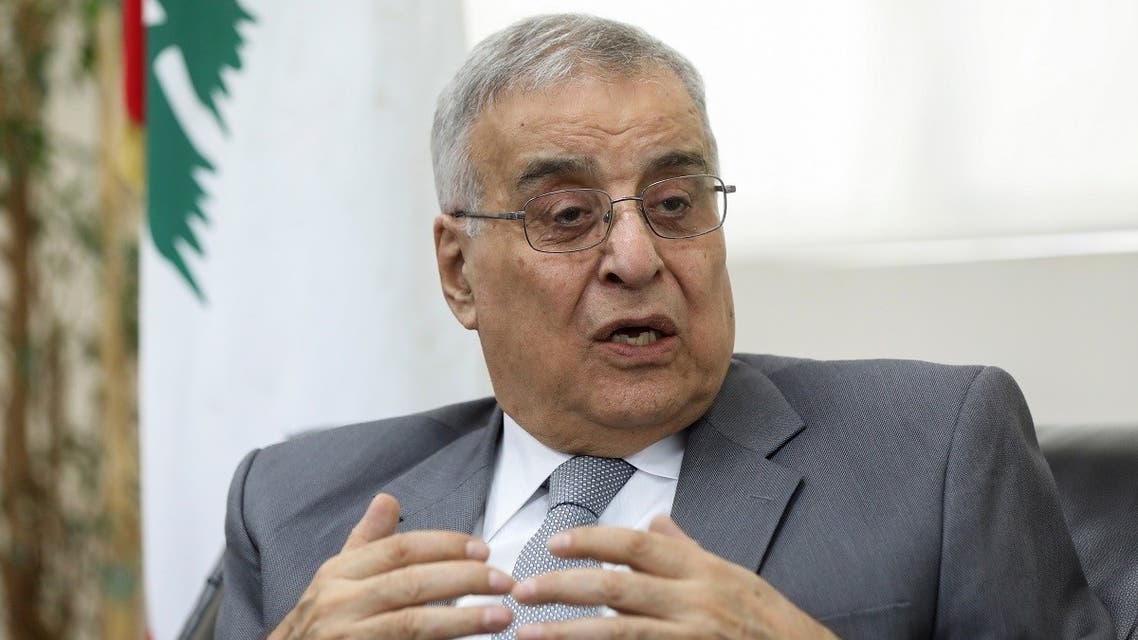BEIRUT, Nov 2 (Reuters) – The English-language Lebanese newspaper The Daily Star has told its staff they will all be laid off, joining a list of Lebanese media outlets that have been forced to close or scale back due to financial pressures. In a message to staff, The Daily Star management said the decision to […]

جريدة الوطن السعودية:
سعي حزب الله للإطاحة برئيس الجمهورية الأسبق ميشال سليمان، الذي أطلق بيان بعبدا المؤكد على حيادية لبنان ضد الصراعات في المنطقة، والرافض لتدخل حزب الله العسكري في سوريا والعراق.
https://www.alwatan.com.sa/amp
نداء الوطن
كان ذلك الهامش موجوداً أيّام الرئيس ميشال سليمان الذي حاول، بمعزل عن الظروف الدوليّة والاقليميّة إلى إبقاء النقاش حول الخطة الدفاعيّة حيّاً بشكل أو بآخر. هذا ما لا يحصل اليوم.
https://www.nidaalwatan.com/ar
الشرق
فعلى الأقلّ الحياد الذي طالب به البطريرك الراعي ومن خلفه اللبنانيون نصّ عليه اتفاق بعبدا قبل تسع سنوات في بنده الثاني عشر الذي نصّ على “تحييد لبنان عن سياسة المحاور والصراعات الإقليميّة والدوليّة وتجنيبه الانعكاسات السلبيّة للتوتّرات والأزمات الإقليميّة، وذلك حرصاً على مصلحته العليا ووحدته الوطنيّة وسلمه الأهلي، ما عدا ما يتعلق بواجب التزام قرارات الشرعيّة الدوليّة والإجماع العربي والقضيّة الفلسطينيّة المحقّة، بما في ذلك حقّ اللاجئين الفلسطينيين في العودة إلى أرضهم وديارهم وعدم توطينهم”، وكذلك مطالبة البطريرك بتطبيق المقررات الدولية وهو بند الرابع عشر الذي نصّ عليه اتفاق بعبدا عام 2012 “إلتزام القرارات الدوليّة،
https://www.elsharkonline.com/
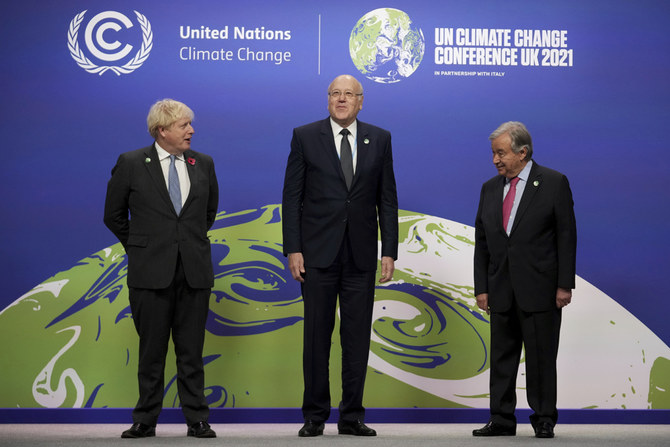
by Najia Houssari — arabnews.com — BEIRUT: Lebanese Prime Minister Najib Mikati visited Saudi Arabia’s pavilion at the UN Climate Change Conference, amid attempts to ease the diplomatic and economic fallout triggered by a government minister’s remarks on the war in Yemen. Mikati was received at the pavilion by the Kingdom’s ambassador to the UK, Prince Khalid bin Bandar Al-Saud, who explained his country’s vision for the environment, a green economy, and climate change. The prime minister praised the green initiatives launched by Saudi Crown Prince Mohammed bin Salman, and he also visited the UAE’s pavilion at COP26. Lebanese Information Minister George Kordahi has caused anger by saying the Iran-backed Houthis were defending themselves in Yemen and that the war should stop. Gulf states, led by Saudi Arabia, have recalled their ambassadors from Lebanon and also instructed Lebanon’s ambassadors to leave.
Kordahi has not quit despite a request from Mikati, and his refusal to resign has the backing of Hezbollah and the Marada Movement. Saudi Arabia said Kordahi’s stance reflected Hezbollah’s hegemony over Lebanon. A delegation of economic bodies met Lebanon’s Maronite Patriarch Bechara Al-Rahi on Tuesday to express their concern about the damage being done to the country and its people. The secretary-general of the economic bodies, Nicolas Chammas, said: “We condemn all that is happening today between Lebanon and the Arab countries, especially Saudi Arabia. The Kingdom has been the leader of the Gulf Cooperation Council for the past 70 years.
by reuters — Lebanon’s foreign minister said Saudi Arabia was dictating impossible terms by asking the government to reduce the role of Iran-backed Hezbollah, adding Beirut’s row with Riyadh be resolved if the kingdom agreed to a dialogue with the new Lebanese cabinet. “If they just want Hezbollah’s head on a plate, we can’t give them that,” the minister, Abdallah Bou Habib, told Reuters in an interview on Tuesday. “Hezbollah is a component of politics in Lebanon. It has a regional armed dimension, yes, but this is beyond what we can resolve,” he said. Lebanon is facing its worst rift yet with Gulf Arab states, spurred by a minister’s critical comments about the intervention in Yemen that described the war there as futile.
Saudi Arabia and some Gulf Arab allies have reacted angrily to the remarks made by the information minister in an interview last week, which he’d filmed before taking up his position in cabinet. Riyadh expelled Lebanon’s ambassador, banned all imports from Lebanon and recalled its envoy for consultations. Kuwait and Bahrain followed suit by expelling the top envoys in their own capitals, while the United Arab Emirates withdrew all its diplomats from Beirut. Saudi Arabia has said its actions were driven not just by George Kordahi’s comments but rather were rooted in its objection to the increasing dominance of Hezbollah over Lebanese politics. The row is part of a longstanding feud between Saudi Arabia and Iran that has played out in proxy conflicts across the region, from Yemen to Syria to Iraq. Gulf states are traditional aid donors to Lebanon but for several years have been increasingly dismayed by Hezbollah’s expanding power, and have so far been loathe to help rescue Lebanon from a devastating economic crisis.
فاقد الشيء لا يعطيه، وينطبق المثل القائل ” اذا كان الكلام من فضة فالسكوت من ذهب “. فلتتوقف الثرثرة والاجتهادات ولتترك المعالجة والكلام لرئيس الحكومة
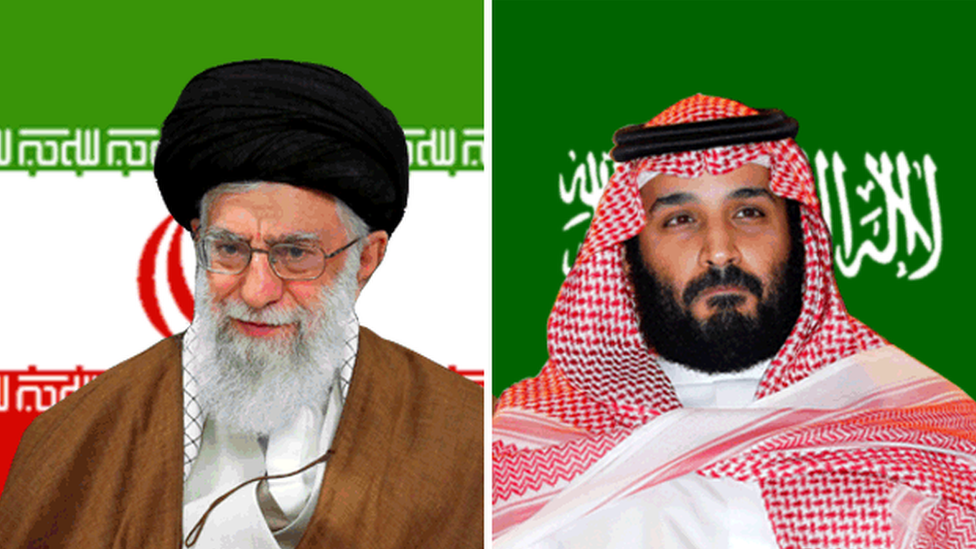
By Tom Perry and Ghaida Ghantous BEIRUT (Reuters) – Already mired in economic collapse, Lebanon is facing a blast of Gulf Arab anger after a prominent broadcaster-turned-minister levelled blunt criticism at Saudi Arabia, in a row that has further strained Beirut’s ties with once generous benefactors. Many ordinary Lebanese fear it is they who will pay the price for the diplomatic deep freeze provoked by the latest spat, which has roots in a long-running rivalry between Saudi Arabia and Iran that underpins conflicts across the Middle East. Saudi Arabia and its fellow Gulf Arab monarchies once spent billions of dollars in aid in Lebanon, and still provide jobs and a haven for much of Lebanon’s huge diaspora. But the friendship has been strained for years by the growing influence of Lebanon’s powerful Iran-backed Hezbollah movement.
Gulf Arab ties with Lebanon hit a new nadir last week when George Kordahi, a former gameshow host recently appointed information minister, appeared in an interview speaking in support of Yemen’s Iran-aligned Houthis and criticising the Saudi-led forces they are fighting. For Riyadh, whose sway in Lebanon has waned as Tehran’s has grown, Kordahi’s comments were just a symptom of Hezbollah’s continued dominance of the political scene, though they were recorded before he took office. Coming as the Houthis advance in Yemen, the fallout of his comments underlines the depth of Iranian-Saudi rivalries. Gulf concerns about Tehran have been stoked by a lack of progress in U.S.-led efforts to revive a deal curbing Iran’s nuclear work. Saudi Arabia and other U.S.-allied Gulf states have long struggled to counter the influence Tehran has carved out across the region by arming, training and financing Shi’ite Muslim groups modelled after Hezbollah, which it founded in 1982.
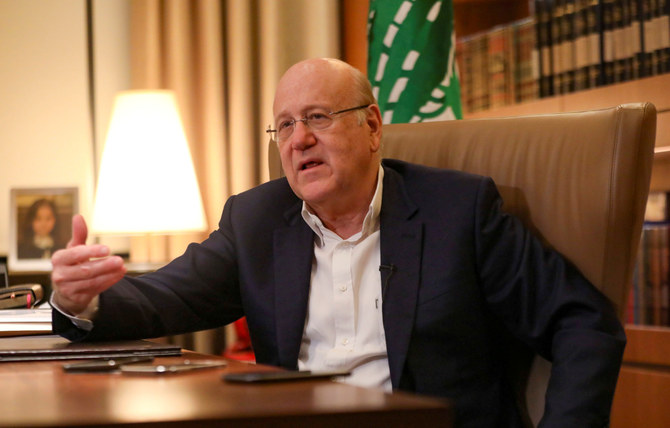
By Najia HOUSSARI — arabnews.com — BEIRUT: Lebanon’s Prime Minister Najib Mikati said on Monday Beirut faces a slippery slope in its growing diplomatic row with the Gulf following controversial comments made by Information Minister George Kordahi on the Arab coalition’s intervention in Yemen. Mikati, who is in Scotland to participate in the COP26 climate summit, sent a message on Monday via WhatsApp to government ministers, in which he wrote that he had “asked Kordahi to prioritize his patriotism over everything else, but this has not happened.” Mikati added: “We are consequently facing a slippery slope.” The prime minister also said: “If we do not resolve this crisis quickly, we will fall into a disaster that none of us wants. God bears witness that I have warned against this.” Kordahi has failed so far to apologize for his remarks, and appeared to rule out offering his resignation in a statement on Sunday.
Saudi Arabia believes Kordahi’s statements to be offensive and represent “a new episode of reprehensible and rejected positions issued by Lebanese officials towards the Kingdom and its policies, in addition to Beirut’s failure to take the measures to stop the export of narcotics from Lebanon.” Beirut has not yet taken any measure to restore ties between the two states, nor Lebanon’s relations with other Gulf nations that have shown solidarity with Saudi Arabia, especially Kuwait, Bahrain and the UAE. Mikati’s warning came as DHL in Lebanon returned mail and goods to customers who wanted them shipped to Saudi Arabia. “The DHL administration was informed by the company’s branch in Saudi Arabia on Saturday that no packages can be shipped to the Kingdom, but there are no instructions so far regarding the fate of shipments from Saudi Arabia to Lebanon,” a source told Arab News on Monday, adding “we have returned all packages to our customers and we are yet to receive new instructions.”

By HUNTER WILLIAMSON — whowhatwhy.org — As if Lebanon didn’t already have enough troubles, it’s now become a flashpoint in a regional power conflict between Saudi Arabia and Iran. Already struggling with political paralysis and economic collapse, Lebanon faces a potentially perilous standoff with some powerful Middle East neighbors: Over the weekend, Saudi Arabia and other Gulf countries recalled their diplomatic representatives and ordered the expulsion of their Lebanese counterparts. The latest crisis was precipitated by Lebanon’s minister of information, George Kordahi, who has had harsh words about Saudi Arabia’s intervention in Yemen’s bloody civil war. That conflict has pitted the government of Yemen, backed by the Saudis, against the Houthi rebels, who are receiving support from Iran, a longtime antagonist of Saudi Arabia. Some analysts have suggested that Saudi Arabia is using Kordahi’s remarks as a pretext for punishing the Lebanese government for its domination by Hezbollah, a political party with a strong paramilitary wing that receives considerable support from Iran. Kordahi’s interview took place in August, before he was named to the Lebanese government. Kordahi described the efforts of Saudi Arabia and its Gulf allies to help Yemen suppress the Houthi rebels as “futile,” and stated that the Houthis were merely fighting to defend themselves.
Saudi Foreign Minister Faisal bin Farhan Al Saud told CNBC Sunday morning that the diplomatic confrontation had less to do with Kordahi’s words than with the malign influence of Hezbollah on the Lebanese government: The comments by the minister are a symptom of a reality — a reality that the political scene in Lebanon continues to be dominated by Hezbollah, a terrorist group that by the way arms and supplies and trains the Houthi militia.
اليوم نحتفل بعيد جميع القديسين في حين ترقص الشياطين على ارض الوطن، فلنحسم قرارنا الى جانب من نقف مع الشياطين او مع القديسين ؟ دعوة المملكة العربية السعودية للحوار امر جيد وممتاز ، ولكن ماذا عن الحوار مع اطراف الداخل وفي مقدمهم حزب الله وحلفائه عن الحياد والسلاح والسياسة الخارجية والعلاقة مع الدول العربية وسيادة […]
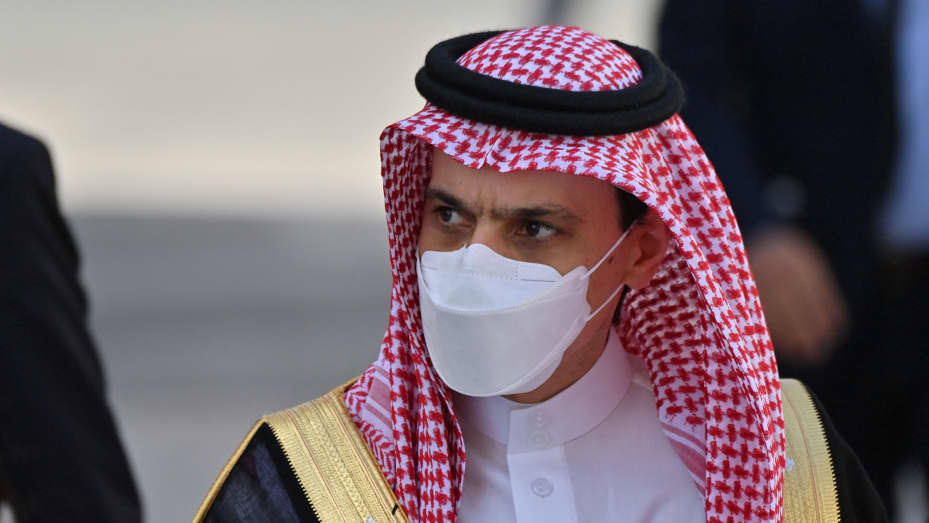
by Holly Ellyatt @HOLLYELLYATT & Sam Meredith @SMEREDITH19 — cnbc — Saudi Arabia’s foreign minister has denied that the kingdom is experiencing a diplomatic crisis with Lebanon but has said the country sees any current engagement with Beirut as not “productive or useful.” The comments come after Saudi Arabia ordered Lebanon’s ambassador to leave the kingdom following what it saw as “insulting” remarks by a Lebanese minister. “I don’t think I would call it a crisis,” Prince Faisal bin Farhan al-Saud told CNBC’s Hadley Gamble in Rome, Italy on Saturday, but said the comments by the Lebanese minister — which referred to Saudi Arabia’s role in the ongoing civil war in Yemen — demonstrated the Iran-backed militant group Hezbollah was increasingly dominant in Lebanese politics. “I think we have come to the conclusion that dealing with Lebanon and its current government is not productive and not helpful with Hezbollah’s continuing dominance of the political scene, and with what we perceive as a continuing reluctance by this government and Lebanese political leaders in general to enact the necessary reforms, the necessary actions to push Lebanon in the direction of real change,” Prince Faisal said. “We have decided that I think engagement at this point is not productive or useful. And it’s not really in our interest.”
Lebanese Information Minister George Kordahi made remarks in an interview in which he referred to the Saudi-led military intervention in Yemen and called the war “futile.” He also appeared to insinuate that Saudi Arabia and the United Arab Emirates were aggressors in the conflict. The ongoing civil war in Yemen, which has lasted seven years, has seen Saudi-led forces (who support the Yemeni government) fighting Iranian-backed Houthi rebels for control of the country. Responding to the comments, Saudi Arabia ordered the Lebanese ambassador to leave within 48 hours on Friday and recalled its own ambassador from Lebanon. Bahrain, Kuwait and the UAE also took similar actions in solidarity with Saudi Arabia. The Lebanese government has sought to calm the diplomatic crisis, reportedly saying that Kordahi’s remarks (which were made before he became a minister) did not reflect its position. There has been mounting pressure on the minister to resign too. For his part, Kordahi has said he did not mean to offend Saudi Arabia or the UAE. Prince Faisal told CNBC that the comments by the Lebanese minister were “a symptom of a reality, a reality that the political scene in Lebanon continues to be dominated by Hezbollah, a terrorist group, a group that by the way, arms and supplies and trains that Houthi militia.” “So for us, it is broader than just the comments of one minister, it is more an indication of the state that Lebanon is in.”
